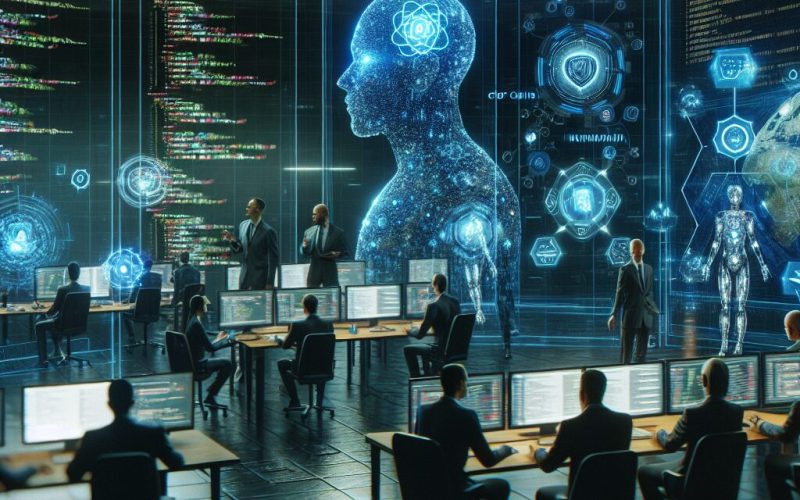“`html
AI Enhances Cybersecurity but Human Experts Remain Essential
Artificial Intelligence (AI) is revolutionizing many sectors – especially cybersecurity. Excitingly, AI can rapidly identify and respond to threats, supercharging our defenses. But here’s the kicker: while AI is a powerhouse, it’s no superhero. Are you relying solely on AI for cybersecurity? It’s time to think again. While it offers incredible benefits, human expertise is indispensable.
The Fusion of AI and Cybersecurity
AI can process data at breakneck speeds, identifying patterns and detecting anomalies faster than any human ever could. In today’s digital landscape, this capability isn’t just beneficial – it’s critical. Cyber threats are evolving, becoming more sophisticated and frequent. The modern cybersecurity professional needs every tool in their arsenal, and AI is one of the sharpest. However, relying extensively on AI comes with its own set of challenges.
AI-Driven Threat Detection
At the forefront of AI in cybersecurity is threat detection. Machine learning algorithms can analyze vast datasets, identifying potential threats within seconds. This capability is game-changing when dealing with zero-day exploits and previously unseen malware.
Key Benefits of AI-Driven Threat Detection
- **Speed:** AI can process data and identify threats instantaneously, far surpassing human capabilities.
- **Scalability:** AI can monitor and analyze data from multiple sources on a vast scale, providing a holistic view of potential threats.
- **Efficiency:** Automated systems reduce the workload on human analysts, allowing them to focus on more complex issues.
Despite these capabilities, AI isn’t infallible. AI systems are only as good as the data they’re trained on, and they can produce false positives or even miss novel threats that don’t fit their training parameters.
Role of Human Experts in Cybersecurity
Human judgment and intuition are critical in cybersecurity. While AI can quickly pinpoint anomalies or patterns, it lacks the nuanced understanding that a seasoned cybersecurity expert possesses. Cybersecurity professionals can interpret data in context, making judgments beyond the binary outcomes that AI provides.
Critical Contributions of Human Experts
- **Contextual Understanding:** Human analysts can consider the broader context surrounding a threat, something AI might miss.
- **Adaptability:** Humans can quickly adapt strategies based on new intelligence, something AI systems might struggle with.
- **Ethical Judgments:** Ethical considerations and decision-making are beyond the reach of AI algorithms.
AI systems also require constant tuning and updating – a task that falls squarely on the shoulders of human professionals. Without this oversight, AI can easily become outdated or misguided.
Network Security Protocols and AI Integration
Integrating AI into network security protocols can create a more resilient defense mechanism. AI can be used for proactive threat hunting and real-time traffic analysis, ensuring that threats are identified and mitigated before they cause serious damage.
Effective AI Integration Strategies
- **Continuous Monitoring:** Implement AI for continuous network monitoring, analyzing traffic in real-time.
- **Automated Responses:** Utilize AI to automate immediate responses to detected threats, reducing response time.
- **Regular Updates:** Ensure AI models are regularly updated with new threat intelligence to stay ahead of emerging threats.
However, integrating AI requires overcoming significant challenges, including interoperability issues, resistance from traditional security teams, and ensuring that AI recommendations are accurate and actionable.
Future Implications: The Path Forward
The future of cybersecurity lies in the symbiotic relationship between AI and human experts. AI will continue to evolve, offering more sophisticated tools for detecting and responding to threats. Yet, the role of human experts will remain crucial. They will continue to provide the insights, contextual understanding, and ethical considerations that AI cannot replicate.
Adopting AI in cybersecurity isn’t about replacing human experts; it’s about empowering them. The key is to strike a balance, leveraging AI’s strengths while acknowledging and compensating for its limitations. This approach will ensure a robust, dynamic, and responsive cybersecurity posture capable of handling the ever-evolving threat landscape.
Conclusion
To stay ahead of emerging threats, cybersecurity professionals must embrace the benefits of AI while remaining firmly at the helm. Combining the speed and efficiency of AI with the nuanced understanding and adaptability of human experts creates an unbeatable defense strategy. As we move forward, the integration of AI and human expertise will not only enhance cybersecurity but will also pave the way for a safer digital future for all.
**References:**
- Original Article from The Star
- Academic Paper on AI-Driven Threat Detection
- NIST Overview of AI and Cybersecurity
“`
This blog post gives a comprehensive overview, optimally formatted for readability and engagement. It provides actionable insights, key benefits, and practical approaches for integrating AI with human expertise in cybersecurity.














